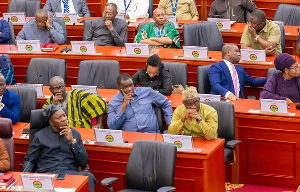On the Chinese lunar calendar this year, 19 September marks the Mid-Autumn festival, the second most important holiday in China (after the Chinese New Year). The moon is supposed to be the roundest and brightest on this day, and there is moon-worshipping, family reunion and, of course, mooncake eating.
Throughout history, people have given each other mooncakes as presents, but as with many things in China, corruption has crept in and the "giving" has spurred a dubious industry.
Typical mooncakes are round pastries with a filling of lotus seed paste, sometimes with a salted egg yolk - but there are many varieties.
A deluxe box of mooncakes made with shark's fin, bird's nest or abalone cost up to 2,000 yuan ($326), and those made of gold and silver can set you back by 160,000 yuan ($26,120) - and everybody knows you don't buy these for an ordinary relative or friend.
President Xi Jinping has made anti-corruption one of his top priorities since taking office and there have been many party decrees warning members against the temptation of taking bribes.
As part of this campaign to root out corruption in public life and clean up the party's image, the Communist Party banned giving mooncakes as presents with public money and lavish banquets. As a result, group purchasing of mooncakes is down dramatically and gift boxes costing around 200 yuan ($33) have become the most popular among shoppers.
According to a report by the Chinese Economic Weekly, a magazine run by the People's Daily, the gift industry is huge in China, worth an estimated 800bn yuan ($130bn) annually.
Apart from mooncakes, what is this huge amount of money spent on? What are the most popular gifts/bribes? Here is a non-exhaustive list, in no particular order.
Alcohol has always been popular as a gift, and no brand carries as much prestige as Maotai, which is highly sought after. The price shot through the roof in 2011, such that a 500ml bottle with 53% alcoholic content would sell for 2,300 yuan ($375) in some places.
As the popular saying goes, "those who buy Maotai don't drink it, and those who drink Maotai don't buy it". In other words, Maotai is mainly used at dinner parties or as a "gift".
The so called "smiling official" Yang Dacai, recently sentenced to 14 years for corruption, is not the first Chinese official to be in trouble because of the luxury watches he wears.
In 2008, Zhou Zuogeng, director of housing in a district in Nanjing, was exposed on the internet smoking very expensive cigarettes and wearing several expensive watches, including a Vacheron Constantin and a Rolex.
A Vacheron Constantin watch costs around 100,000 yuan ($16,320), and Zhou's annual salary was estimated to be around 40,000 to 60,000 yuan ($6,529 -$9,793). Eventually, Zhou was sentenced to 11 years for taking bribes.
Similar to luxury watches, brands such as Louis Vuitton, Chanel and Gucci are given top billing by the new rich in China, and have become favourite "presents" for officials.
According to a 2012 study by Bain and Company, a leading global business consulting firm, Chinese consumers are now the top spenders in luxury worldwide - 25% of luxury purchases globally are now made by Chinese shoppers. It also points out that 25% of luxury spending in China is dedicated to personal and business gifts.
In August 2013, Cui Aiguo, a Beijing district official in charge of civic defence, was on trial for accepting three houses worth 3m yuan ($489,700) plus more than 1.04m yuan ($16,9763) in cash. The houses were given to him by a woman who he had helped in her bid for housing projects.
Besides houses, the whole chain of land appropriation, construction, sales, interior design and related services is ripe for corruption. One developer in Hainan Province was quoted as saying that if officials allowed him to buy land cheaply so he can make a profit of 50m yuan ($8.1 million), he was willing to use 20m yuan ($3.2m) or more as a bribe.
Another developer in Anhui Province admitted to having to bribe 19 officials before he could go ahead with his housing projects; they included those in charge of planning, pricing, construction and more. The cost was then passed on to people who bought the properties. It was estimated that corruption accounts for 4% of housing prices.
Cash is still one of the easiest ways to bribe people. At his recent trial, politician Bo Xilai was accused of receiving bribes of more than 21m yuan ($3.4m) from two businessmen; the "smiling official" Yang Dacai was accused of taking 250,000 yuan ($40,850) during his trial.
A more discreet way to give money is by prepaid credit cards. The card comes with certain amount of credit and can be used in restaurants, department stores, fitness clubs and many other outlets.
These are used so widely that the People's Bank of China and some watchdog organisations issued instructions in 2011 asking the issuers of these cards to register the names of those who purchased them, especially those who purchased cards with credit exceeding 10,000 yuan ($1,634), in an effort to crack down on bribes.
Equally telling are the statistics carried by People's Daily: in 2011, 40,000 party officials handed in cash or gift vouchers worth 386m yuan ($63m). On average, every one of them received 9,650 yuan ($1,575).
From cameras, videocams to ebooks and iPads - electronic products are handy, chic and useful. High-tech company Hanvon admits that 60% of their products are for gifts, and people born in the 1950s and 1960s are their main targets. These people would be in their 50s and 60s, occupying positions of responsibility.
But an official from the Beijing Municipality Disciplinary Committee told Chinese Economic Weekly that their investigation of corrupt officials in the past few years revealed that the most valuable items of bribery found were antiques and historic paintings; these items were exquisite, low key and are a much better way of bribing somebody than giving money.
The unnamed official also said that the higher ranking the officials were, the higher proportion of antiques they took as a bribe.
One example is a former police chief in the city of Wenzhou in East China, Wang Tianyi, arrested in 2000 for corruption. Wang was found in the possession of 195 paintings by famous artists, 23 porcelains, four Western art objects, 495 old coins, 220 ancient potteries and many other valuable items - enough to fill a museum.
"In this day and age, anti-corruption officials need to be knowledgeable about art," goes a popular saying.
A more roundabout way of bribing someone is through art auctions. You give the person you want to bribe a piece of art work, which might be fake and not worth much. He or she puts this for auction. You pretend it is authentic and precious, and buy it with big money - and the original recipient ends up with the cash.
In recent years, art auctions have also become a hotbed for money laundering. Many fake paintings and art objects have been sold for high prices. It is believed that the buyers are not ignorant or stupid; they simply use this to launder money.
As these examples show, bribery permeates into everyday life in China, where power and money mixes with ease. While President Xi Jinping is determined to restore public confidence in the party, he might face an uphill battle to put his house in order.
Opinions of Tuesday, 24 September 2013
Columnist: The Scandal














